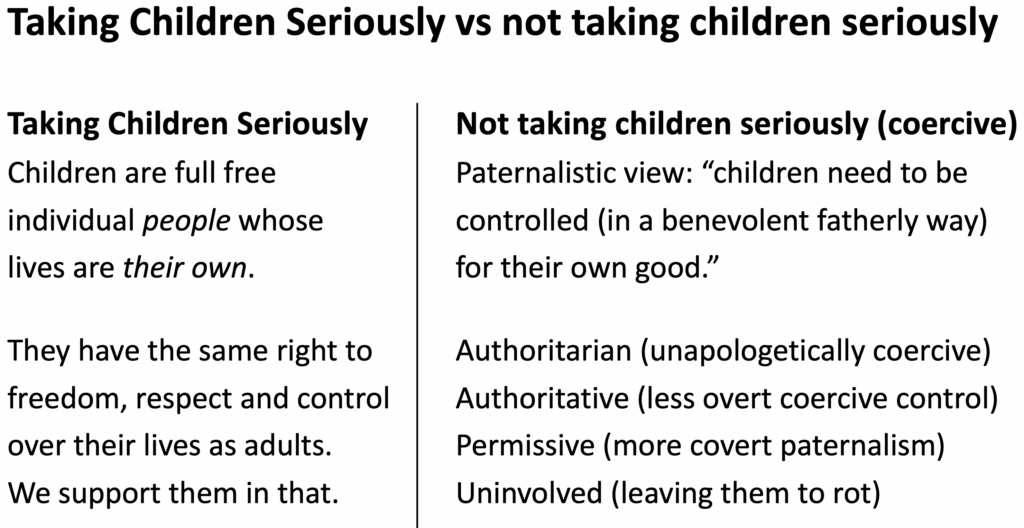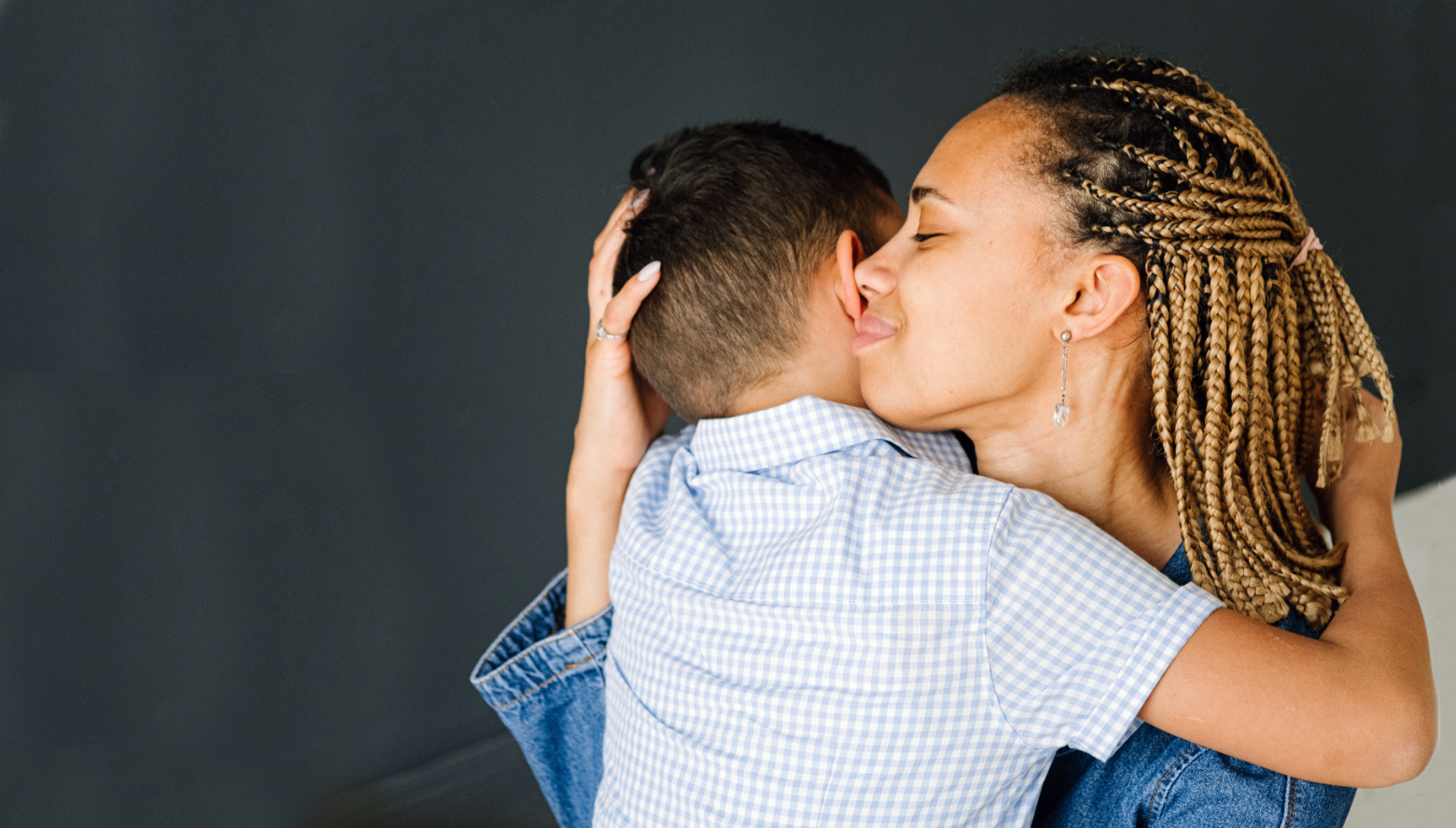“Taking Children Seriously does not fit into any of those categories: permissive, neglectful, authoritative or authoritarian. They are all coercive.”
– Sarah Fitz-Claridge
“Which parenting style is Taking Children Seriously? Authoritatarian, authoritative, permissive, or uninvolved?”
Taking Children Seriously does not fit into any of Diana Baumrind’s categories: permissive, neglectful/uninvolved, authoritative or authoritarian. They are all coercive:

Taking Children Seriously vs coercive approaches not taking children seriously
The approaches not taking children seriously are coercive. They are either unapologetically coercive (authoritarian) or the coercion is less overt. The prevailing view of children that does not take them seriously is paternalistic. In the past, women were viewed paternalistically—as needing to live under the (benevolent fatherly) control of their father or husband—but now (at least in Western culture) it is obvious that that is a mistake. Women are now taken seriously as full persons in their own right. But even Western culture has not quite yet noticed that children too are full persons whose lives are their own.
Taking Children Seriously is a new view of children: children are people just like adults are. Their lives are their own, just like ours are our own. Just as we ourselves do not appreciate being coercively controlled (even if the person doing it genuinely thinks we need to be controlled for our own good, and he tries to be benevolent about it!), neither do children.
Human beings are all fallible: we all make mistakes, including parents. We also all lack knowledge. But for adults, lacking knowledge and making mistakes does not result in other people thinking we need to be controlled for our own good. We still get to control our own lives no matter how stupid, ignorant and devoid of sense we are, and no matter how many mistakes we make.
There is nothing wrong with children. They are no more defective, broken and needing to be fixed than we adults are. If anything, children are more rational and creative (able to come up with brilliant new ideas, explanations and solutions to problems, able to learn, improve, make progress) than we are.
So instead of interacting with them in a top-down authoritarian relationship in which we are bossing children about, setting limits for them, moulding and shaping them, and paternalistically channelling them into our pedagogical agenda for them that is independent of their own wishes, we interact with them as fellow full human beings, each of us having our own life, our own preferences, our own wishes, our own interests.
Paternalistic approaches are very well-meaning but they violate children’s personal boundaries by coercively intervening in their business. Taking Children Seriously involves giving our children lots of support, engagement, love and protection, but we do that without violating their boundaries. Their life is a matter for them, just as, ultimately, your life is a matter for you. If that, to you, sounds like advocating leaving children to rot, you may be viewing children through the lens of paternalism. Children being free does not actually imply that they are being left to rot. Happily, they can be free and have loving parents engaging with them. A parent can be supporting and engaging with his children without coercively controlling them, just like a husband can be supporting and engaging with his wife without coercively controlling her. When it comes to us ourselves, thinking about our happy marriage or our relationship with our dearest friend, it is easy to see that there is a possibility other than coercive control or nothing: mutually-delightful, loving, supportive, noncoercive engagement!
“Would you agree, checked-out uninvolved parenting is a type of noncoercive parenting? Like, the kid’s not being told what to do.”
No, I would not agree that that is in any way noncoercive. There is a lot more to taking children seriously than merely not telling them what to do. As Lulie Tanett says, “Taking Children Seriously would be as bad as coercive parenting if it weren’t actively offering culture, ideas, possible paths, moral knowledge, etc. Children figuring out the world alone is just as much a mistake.” In other words, it would not be taking children seriously, it would precisely be coercive.
In the relevant sense—what is going on in the mind of the child—having a checked-out uninvolved neglectful parent is indeed very much coercive. What must it be like to be a child with a parent who is, for example, a checked-out addict or who is severely depressed or suffering from some other (untreated) debilitating psychiatric condition? Imagine how it would be to be a child in such a scary, lonely, situation, with a parent who is unable to give you the engagement, the protection, the love, the resources, the access to the world, to interesting people, to all the opportunities children taken seriously have. You wouldn’t even be able to enjoy the creative conversational togetherness of watching a video together and talking about it.
Even if the issue were not addiction or mental illness—say the parent lacked the wherewithal to give the child the involvement needed due to having to work three jobs to keep a roof over their heads—the effect could be terribly coercive for the child.
If you want to call that ‘non-coercion’, then Taking Children Seriously is not just any kind of (what you call) ‘non-coercion’, it is a very engaged, thoughtful, interventionist, connecting kind. We are actively solving problems together, having interesting conversations together, exploring together, having fun together. What we are aiming for in taking our children seriously is childhood without coercion, not childhood without parents!
“If Taking Children Seriously is not about leaving children to rot, surely it must be permissive parenting?”
No. “Permissive parenting” is often an authoritarian’s disparaging term for parents who are falling down on the job, irresponsibly failing to give their children the firm hand they (supposedly) need. Perhaps there are parents who feel aligned with the “permissive parenting” label, such as those who favour “yes parenting” and those who ‘let’ their children do a lot more than “authoritative” parents do, but the idea of being “permissive” still assumes it is the parent’s right to give permission to their children—or to refuse it—rather than viewing children as full persons free to make their own choices for their own lives.
Taking Children Seriously is not about increasing the number of things we allow our children to do. It is not about saying “yes” more. It is not about being more lenient. It is not about giving our children more choices, and it is not even about giving them more freedom. If we are the ones deciding how much freedom to allow, or what to say “yes” to, then we could choose to allow less freedom, we could choose to start saying no more. In other words, we are still viewing our children through the lens of paternalism, and we are in an authoritarian hierarchical top-down relationship with them instead of an equal, horizontal, side-by-side relationship in which no one is deemed to be an authority.
Taking Children Seriously views each person, including each child, as being a full sovereign individual whose life is their own, not ours to control.
“That sounds like never saying no. How is that different from the permissive parents I see who never say no to their kids and they are living in miserable chaos?”
When people use the phrase “permissive parenting” they often have in mind parents who merely “never say no.” Those “permissive parents” are not actually solving problems and creating knowledge together with their children, they are self-sacrificially not saying no, and that pattern of self-sacrifice is excruciatingly painful, and there is a lot of numbing of their painful feelings and there is a lack of authentic connection, communication and the joy and fun of joint knowledge creation. And because of the lack of enjoyable joint problem-solving in the family, it can indeed look like miserable chaos. There can also be a blankness, a deadness, a flatness, faces lacking aliveness, eyes not sparkling, guardedness, inured to pain, suffering. This kind of “permissive parenting” is a ghastly mixture of neglect, self-sacrifice, self-silencing, suppressing feelings, and “not saying no”, punctuated by bouts of explosive coercion of the children caused by the stress and resentment that inevitably results from all that self-sacrifice.
Such parents of course mean well but they are not taking themselves seriously, and they are not taking their children seriously either. Taking Children Seriously is not just “not saying no”, it is not about “not saying no”, it is about us all having fun together solving problems together rather than interfering with the growth of knowledge—it is really about taking all the available ideas and feelings seriously—welcoming all to the table—no ideas/feelings/sources thereof treated as authoritative—and embracing the freely flowing problem-solving processes of the family. This also involves the different parts of our own mind harmoniously solving problems together instead of one part of our mind coercively overriding another part of our mind. (Self-sacrifice is precisely one part of your mind forcibly overriding another part against that other part’s will. It is very self-coercive. And coercion anywhere in the system (including in the mind of the parent!) is impeding the growth of knowledge and impairing the system’s ability to solve problems. It is not possible to take our children seriously without also taking ourselves seriously. We are actively solving problems together, having interesting conversations together, exploring together, having fun together. The knowledge-creating institution (system) of our family is flowing with problem-solving, and that includes within our own minds too.
So no, Taking Children Seriously is definitely not the miserable self-sacrificial “not saying no” style “permissive parenting” some new to Taking Children Seriously (understandably!) imagine.
See also:
- “What do you mean by ‘having an agenda’ for your children? Are all wants for your children agendas?”
- Taking the free world and children seriously: an anecdote
- It is impossible to control for all the variables in any experiment involving human psychology
Sarah Fitz-Claridge, 2022, Taking Children Seriously FAQ: ‘“Which parenting style is Taking Children Seriously? Authoritarian, authoritative, permissive, or uninvolved?”’, https://takingchildrenseriously.com/which-parenting-style-is-taking-children-seriously-authoritarian-authoritative-permissive-or-uninvolved/
